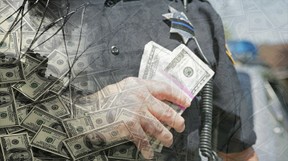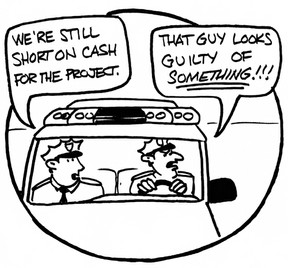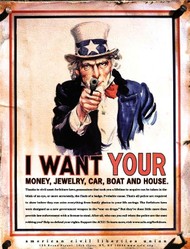It goes by the somewhat innocent sounding names of “equitable sharing program” or “civil-asset forfeiture,” but those who have fallen victim to the process are more inclined to call it highway robbery. Under the guise of fighting terrorism, the drug trade, or organized crime, law enforcement officials are allowed to confiscate valuables derived from crime from people and to use the proceeds to fight lawbreakers. In 42 states, the authorities only need to “suspect” that cash might come from illicit activity in order to seize it; conviction for a crime is not necessary and neither is a warrant.

American Cop Shakedown
by RupertTaylor
Innocent U.S. citizens are being deprived of their valuables under the rules of civil forfeiture
The Roadside Stop
The process usually starts with a police officer pulling over a vehicle ostensibly because of some minor infraction
 The cop engages in a conversation and makes a request to search the vehicle – “Sir or Madam, we have to be vigilant about terrorism, drug trafficking…”
The cop engages in a conversation and makes a request to search the vehicle – “Sir or Madam, we have to be vigilant about terrorism, drug trafficking…”
The driver is neither a raving jihadist nor a heroin dealer so agrees to the search. But, as Neil Macdonald of the Canadian Broadcasting Corporation reports the talk about catching criminals is all a smoke screen: “What he’s really looking for, though, is money.”
Should the driver be unlucky to have a roll of fifties in the glove box he or she is going to lose it.
Macdonald continues “The officer will probably produce a waiver, saying that if you just sign over the money then the whole matter will just disappear, and you’ll be able to go on your way.”
If you don’t sign the waiver then a series of unpleasant things is going to happen.
Multi-Million Dollar Haul
Big money is involved in civil forfeitures
 The Washington Post carried out an investigation in the summer of 2014 and found that since 2001 there have been 61,998 cash seizures on roadsides and in other circumstances without the use of warrants. The total amount taken adds up to $2.5 billion.
The Washington Post carried out an investigation in the summer of 2014 and found that since 2001 there have been 61,998 cash seizures on roadsides and in other circumstances without the use of warrants. The total amount taken adds up to $2.5 billion.
No doubt, some of this has come from criminals, but many innocent people also have been caught in the trap.
The New Yorker told the story Jennifer Boatright of Houston. With her two sons and boyfriend, Ron Henderson, she was on her way to buy a used car. Outside the town of Tenaha, near the Louisiana border, their car was pulled over.
Could the officer and his partner search the car? They found the cash the couple had to buy the car “and a marbled-glass pipe that Boatright said was a gift for her sister-in-law.” They were escorted across town to the police station.
 Although no drugs were found, the police report said the couple were suspected of being drug couriers because they came from Houston “a known point for distribution of illegal narcotics.” The children were described as possible decoys.
Although no drugs were found, the police report said the couple were suspected of being drug couriers because they came from Houston “a known point for distribution of illegal narcotics.” The children were described as possible decoys.
That’s when a deal was put on the table. Here’s how The New Yorker describes the offer: “They could face felony charges for ‘money laundering’ and ‘child endangerment,’ in which case they would go to jail and their children would be handed over to foster care. Or they could sign over their cash to the city of Tenaha, and get back on the road.”
The couple handed over a little more than $6,000 and left with the kids.
 Town has a reputation for asset seizure especially from black drivers |
Legal Theft
Asset forfeiture is a very powerful tool that turns the presumption of innocence on its head
 Following the terror attacks of September 11, 2001, Americans lost many of their freedoms and civil rights in the so-called “War on Terror.” Washington’s Homeland Security called on local police forces to be more aggressive in looking for suspicious characters and drugs.
Following the terror attacks of September 11, 2001, Americans lost many of their freedoms and civil rights in the so-called “War on Terror.” Washington’s Homeland Security called on local police forces to be more aggressive in looking for suspicious characters and drugs.
Millions of dollars were spent on training officers in techniques aimed at apprehending the bad guys; techniques that are now being used in civil-asset forfeitures.
Cash-strapped municipal police forces are using the seizure of valuables to finance their operations, among other things.
Using the very powerful tool of civil forfeiture authorities can seize valuables without filing criminal charges. It’s then up the owner to prove his or her innocence in order to get their property back. The process is long and usually costs more than the value of whatever was taken, so only about 16 percent of the seizures are challenged.
Scott Bullock of the Institute for Justice notes that “Under civil forfeiture you give law enforcement a direct and perverse incentive to go out and try to take as much property from citizens as possible.”
Constitutional Violation?
Spending the Ill-Gotten Gains
Some of the civil forfeiture cash goes for dubious purposes
 Ron Hain is a deputy police chief in Illinois. He has written a self-published book in which he advocates “turning our police forces into present-day Robin Hoods.”
Ron Hain is a deputy police chief in Illinois. He has written a self-published book in which he advocates “turning our police forces into present-day Robin Hoods.”
The legend of the man from Sherwood Forest suggests he stole from the rich to give to the poor. Deputy Hain seems to want to distort that yarn by taking from the innocent and then keeping the money.
But sometimes, the money doesn’t even go to boost police budgets. According to Nick Sibilla, forfeiture proceeds have been used by:
-
Romulus, Michigan’s police chief to buy his wife a tanning salon ($75,000);
-
A Texas district attorney to fly his office staff and spouses to Hawaii for a six-day vacation ($27,000); and,
-
Camden County, Georgia’s Sheriff Bill Smith to purchase a Dodge Viper ($90,000).
The Institute for Justice adds that “One New York police department used forfeiture funds to buy food, gifts, and entertainment. In Georgia, forfeiture funds paid for football tickets … And a district attorney in Texas used forfeiture dollars to buy TV ads for his re-election campaign.”
How the folks whose money covered these expenses feel about this is not recorded.
Sources
“American Shakedown: Police Won’t Charge you, but they’ll Grab your Money.” Neill Macdonald, CBC, September 11, 2014.
“Taken.” Sarah Stillman, New Yorker, August 12, 2013.
“Stop and Seize.” Michael Sallah, Robert O’Harrow Jnr., Stephen Rich, Washington Post, September 6, 2014.
“Policing for Profit: The Abuse of Civil Asset Forfeiture.” Institute for Justice, March 2010.
“The Shame of ‘Equitable Sharing.’ ” Nick Sibilla, Slate, April 2, 2014.
You might also like
What Is Wrong with Politics?Politics are often the source of complaints, and there is much to complain ab...
Prophet Muhammad Halloween Costume to be Outlawed in NYCFollowing the recent soft drink ban and middle east riots over a badly made v...




 How Stores Manipulate Customerson 07/16/2014
How Stores Manipulate Customerson 07/16/2014
 Corruption in Russiaon 06/27/2014
Corruption in Russiaon 06/27/2014
 The Oak Island Treasureon 03/21/2014
The Oak Island Treasureon 03/21/2014
 Measuring the Middle Classon 10/30/2013
Measuring the Middle Classon 10/30/2013



Comments